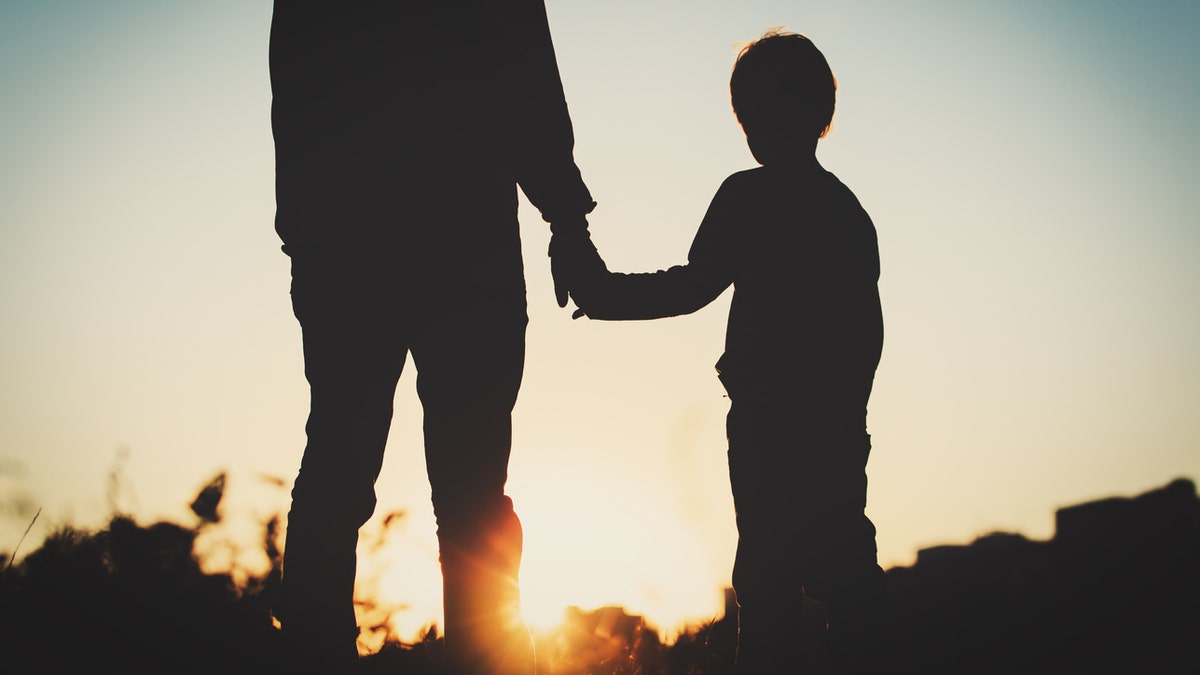
silhouette of father and son holding hands at sunset sky (iStock)
In a recent article in GQ headlined “Are Kids the Enemy of Writing?” the novelist Michael Chabon describes a conversation he had many years ago with a writer he admired. At the time, Chabon was engaged to his now ex-wife, and his first novel was about to be published.
“I’m going to give you some advice,” the writer told Chabon. He said the advice would be painful and that Chabon would be smart to pay attention.
“Don’t have children,” the writer said. “That’s it. Do not. That is the whole of the law. … You can write a great book, or you can have children. It’s up to you.”
Chabon goes on to paraphrase the reason for this man’s advice, which went something like this: ‘Writers need to be irresponsible to everything but the writing. … They need to be free of commitments to everything but the daily word count. Children, by contrast, need stability, consistency, routine, and above all, commitment. In short, children are the opposite of writing.’
As a writer who began the publishing process in earnest after I had the first of my two children, I can vouch for the fact that children are indeed the opposite of writing. In fact, they’re the opposite of any career that demands an adult’s undivided time and attention.
I’m often asked why I’m not more front and center – more out in the limelight. I’m asked why I don’t do more videos and why I don’t give more speeches. And the answer is obvious: because I have kids.
In fact, now that my oldest has graduated from high school and my youngest is about to drive and has a bona fide “they take how much tax out of my paycheck?” job, I already feel lighter – so much so that I can finally up the ante in my career.
There are two things we never talk about when it comes to children and ambition. First, that these two endeavors do not blend but are in fact are in direct opposition to one another. And second, that fathers today feel this conflict just as much as mothers do.
We talk about work and family as though the inevitable tug-of-war is a personal vendetta against women. It is not. The battle is over time. “Children,” the writer told Chabon, “are notorious thieves of time.”
Indeed they are, which is why any conscientious dad who wants to be involved in his children’s lives will suffer, just as mothers do. It may not pull on a father in quite the same way, particularly if their children are well cared for; but it can be source of stress just the same.
And when a man makes a career choice early on, as the writer told Chabon, he should know that some careers just don’t mix well with fatherhood.
Take my husband, for example. When he was in his 20s, he got a master’s degree in English and taught poetry at the college level. And while there’s more than one reason why he made a career switch to business, at the end of the day he realized he wanted a family (and more money!) more than he wanted to be the next great Pablo Neruda – or to be anything that wouldn’t allow him to be home for dinner with his family every night.
“Having an important impact on my kids’ lives,” he notes, “is far more valuable than being a CEO, where once you retire no one really thinks about you – or if they do, it’s fleeting. Maybe people erect a building in your name like the Wainwright Building in downtown St. Louis. But that building is known for its architecture, not for the guy in whose name it was erected. And, frankly, who’s going to take the time to look up and research some rich dead guy the building’s named after?”
That is not to discredit those who dream big and who are successful with their dreams. It is merely to recognize the trade-offs that are made and to put such a life in perspective.
Namely, let’s stop coveting big careers as the pinnacle of human fulfillment when the losses incurred are great. Such positions of power and responsibility are all-consuming. They literally take over your life, until you wake up one day and realize you have no other life.
So here’s a Happy Father’s Day to all the men who’ve compromised on goals they might have otherwise reached had they chosen not to have kids. They know who they are, and they know what they have instead. And their families are better off because of it.








































